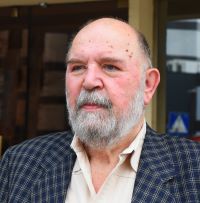Could it be that numerous theater festivals, from Slovenia to Macedonia, and with an ‘international’ prefix are places where this limiting space of freedom can be successfully broken through?

Mladen Bićanić
When it comes to freedom of expression in the region, the situation is challenging and worsening. According to Reporters Without Borders’ World Media Freedom Index for 2023, Bosnia and Herzegovina is ranked 64th, Kosovo 56th, Serbia 91st, and Montenegro 39th out of a total of 180 countries.
Writers, journalists and others engaging in the public space are faced with an ever-shrinking space in which alternative voices could be heard… /According to the Report of the International PEN Center “Toxic narratives that stifle freedom of expression in the Western Balkans” – newspaper “Danas” 24. X 2023. /
This is the case when it comes to freedom of the press and public speech in this vicinity, but can we notice some encouraging and more desirable developments elsewhere, say in the theater?
Could it be that numerous theater festivals, from Slovenia to Macedonia, and with an ‘international’ prefix are places where this limiting space of freedom can be successfully broken through?
Attending some of them over the past two decades, I think that an attentive and benevolent observer can still get the impression that these gathering places of theater workers, but also very interested audiences, bring, through theatrical play, mutual encounters and exchange of experiences, a very welcome change that “goes against dominant narratives”.
This is where, sometimes, the “unspeakable” really happens – as the Nobel committee for awarding this year’s literature prize referenced when awarding the Norwegian writer Jon Fosse, for “…creativity rooted in the language and nature of his Norwegian hinterland with artistic techniques on the trail of modernism and for innovative dramatic pieces and prose that communicates the unspeakable…”
Even a cursory look at some of the international theater festivals in Croatia, BiH and Serbia in recent years can easily confirm that this is the case.
In Bosnia and Herzegovina, for example, we have the renowned MESS festival in Sarajevo, which gathers theater companies and theater groups not only from our vicinity but from all over the world; Belgrade’s BITEF or Zagreb’s World Theater Festival, all show that domestic theater can only benefit from the exchange of experiences and the interweaving of contemporary theatrical tendencies and theatrical poetics in one place.
The situation is similar with the theater festivals that rely more on theatrical reach in the region: Festival of Small Scenes in Rijeka, International Theater Meetings in Brčko, International Theater Festival Golden Villa in Prijedor, or Desire Central Station in Subotica, to name just a few examples – festivals I had the opportunity to follow and write about – they are also exceptional encounters between people from the theater and the audiences who tear down artificially established borders that demarcate them.
“There is no Bible in theater that can teach you to create; it is, first of all, a decision not to know anything about the outcome. Routine kills art”, are the words of theater worker Andraš Urban. But that routine can be understood in a different way, in a much broader way – the routine in which we clothe ourselves in our daily lives, forgetting that there are also other important things in life, which, however, need to be fought for – like the freedom that was not given to us once and for ever.
Film director Goran Marković reminds us of this when he says: “…You just have to rebel.” To say publicly: I will not live like this!…”
Theater festivals in the region, turns out, can also be a good barrier against this anesthesia.
Mladen Bićanić, journalist, theater critic



Leave A Comment